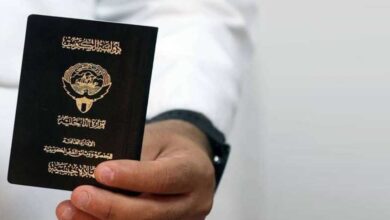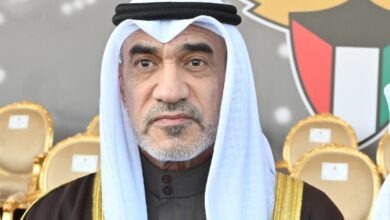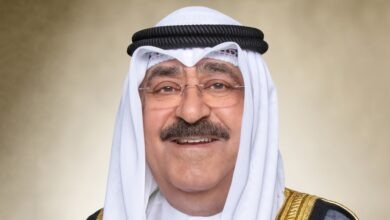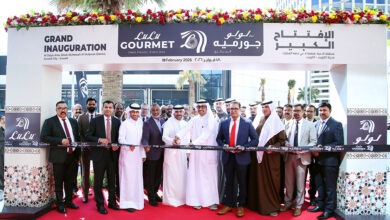Public debt law nears final stage, set to drive major infrastructure projects
Eng. Noora Al-Fassam said the government’s plan to bridge the budget deficit through financing tools, particularly the public debt law, will enable international entities to finance development projects and serve as a key growth tool.

• Eng. Noora Al-Fassam, Minister of Finance and Minister of State for Economic Affairs and Investments, stated that once the public debt law is enacted, funds will support capital projects to diversify the economy through public-private sector partnerships and debt instruments like bonds and Islamic sukuk, ultimately helping reduce the future deficit.
Eng. Noora Al-Fassam, Minister of Finance and Minister of State for Economic Affairs and Investments, announced that the public debt law is in its final stages. This law will serve as a financing tool to provide liquidity, primarily for investment in infrastructure projects, Al Jarida newspaper reported.
During the Ministry of Finance’s conference on the general budget for the fiscal year 2025/2026, Al-Fassamconfirmed that work is being carried out under the directives of His Highness the Prime Minister Sheikh Ahmed Al-Abdallah, and the decisions of the Council of Ministers, reflecting the strategic orientations of the state, its general policy, and its future aspirations to achieve development, economic, and social goals.

She reviewed the draft budget for the fiscal year 2025/2026, which shows public revenues amounting to KD 18.2 billion, a deficit of KD 6.3 billion, and expenses totaling KD 24.5 billion.
Oil revenues drop 5.7%, non-oil revenues surge 9% in fiscal year projections
She explained that oil revenues were projected at KD 15.3 billion, a 5.7% decrease from the previous fiscal year, due to an estimated oil price of $68 per barrel. Non-oil revenues are expected to reach KD 2.9 billion, reflecting a 9% increase from the prior year.
Regarding the components of budget expenditures, salaries and related costs amounted to KD 15.0 billion, subsidies were KD 4.4 billion, capital expenditures totaled KD 2.2 billion, and other expenses reached KD 2.8 billion.
Financial balance
In her speech, she stated, “The preparation of the draft budget for 2025/2026 results from careful financial and economic planning aimed at achieving development goals and enhancing the financial sustainability of the state. This budget reflects the government’s commitment to achieving financial balance through the application of financial and economic reforms, addressing structural imbalances, and improving government administration efficiency.”
“We have also initiated serious steps with a positive impact on increasing non-oil revenues while continuing to rationalize expenditures and control government spending efficiency. Through this budget, we aim to implement fiscal policies that promote sustainable growth and ensure a stable economic environment,” she added.
Creating job opportunities through private sector involvement
Minister Al-Fassam continued: “We are in the ‘construction and completion stage,’ which includes 90 new construction projects along with the completion of existing ones. Financial appropriations are allocated for comprehensive maintenance to ensure service efficiency. All financial links have been monitored and made available to government agencies. Efforts are also underway to approve and enact various decrees, laws, and legislation to guarantee the timely implementation of objectives and the positive impact of the next government’s work program.”
Increasing capital expenditures
Regarding the volume of capital expenditure in the draft budget for 2025/2026, the minister stressed that the Ministry of Finance’s approach is to gradually increase capital expenditures in the coming years, based on a strategic spending plan. This plan focuses on private sector partnerships, direct government capital spending, and the completion of existing projects.
The minister also referred to the directives from the Council of Ministers to complete and expedite the implementation of several major development projects, including the Mubarak Al-Kabeer Port Project and the Kuwait International Airport Terminal Project, which play a key role in economic growth plans. Additionally, the Umm Al-Hayman Terminal Expansion Project was mentioned, where best practices were incorporated to contribute to sustainability.
She also highlighted the importance of infrastructure development, education, health, and creative projects, emphasizing the commitment to financial transparency and providing more effective government services.
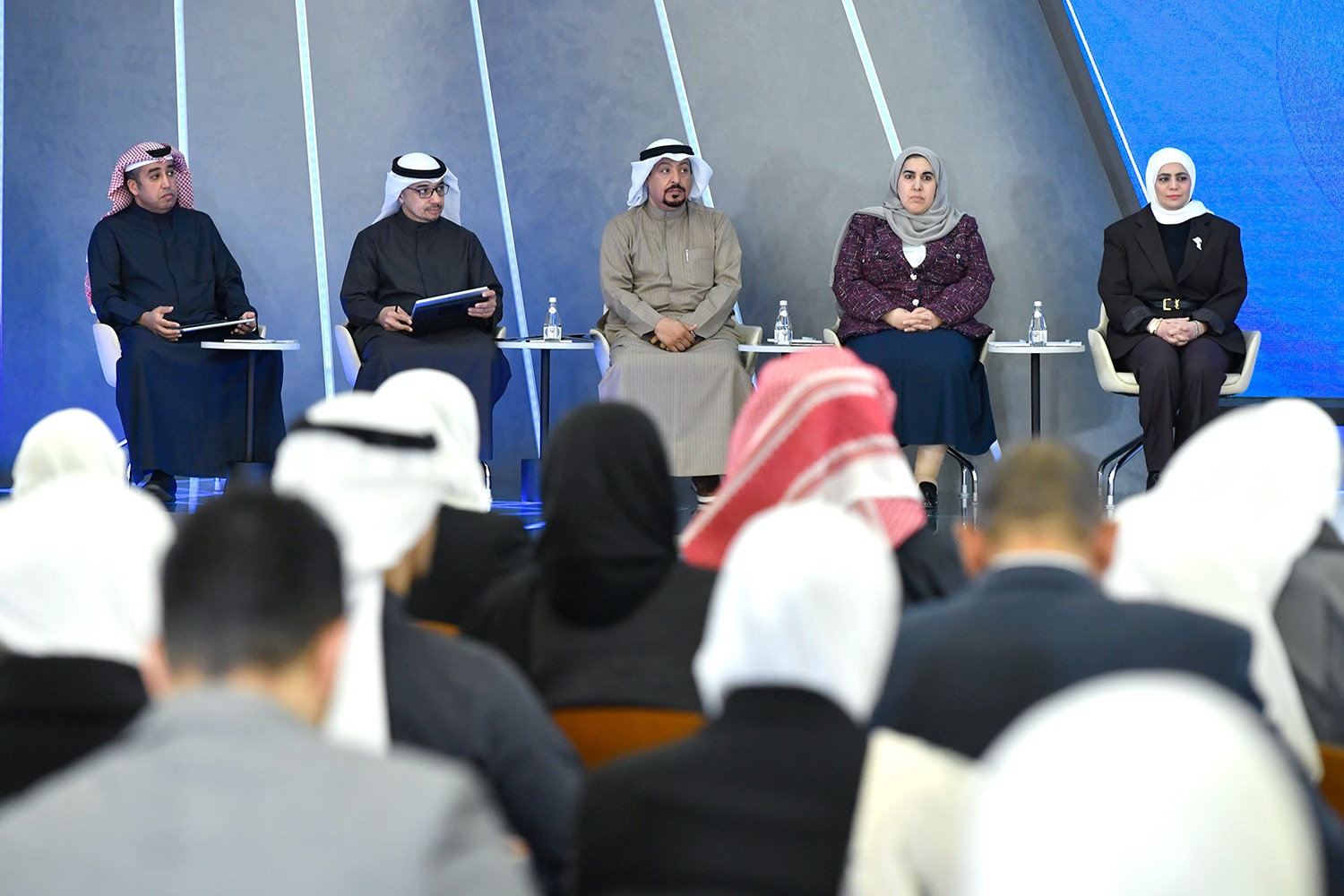
Accelerating private sector integration into government projects
During the conference, she emphasized the need to accelerate the documentary process for private sector involvement in future government projects by reviewing current legislation and exploring potential amendments, which will be addressed by the government team in the next phase.
15,853 jobs in the next financial year
She added, “In this budget, in cooperation with the Council of Ministers, we aim to reform and support the law regulating the private sector to make it one of the pillars of the national economy. This will help absorb greater numbers of national workers and create new economic sectors and opportunities suitable for the national workforce. The next budget accounts for providing 15,853 job opportunities.”
She also stated that projects are continuing under the draft budget for the fiscal year 2025/2026, which includes 373 ongoing projects at a total cost of KD 12.814 billion. This includes the Mubarak Al-Kabeer Port Project (Part I), expected to be completed by 2028, the Kuwait International Airport Terminal 2 project, expected by 2027, and the Umm Al-Hayman terminal expansion, expected to be completed in 2025.
Regarding the new projects included in the draft budget for the fiscal year 2025/2026, 21 projects were added with a total cost of KD 246.8 million.
She mentioned the primary goal of establishing advanced housing cities with sustainable urban planning in partnership with the private sector, aiming to provide a sustainable living environment through modern housing projects.
Budget deficit due to pressure on oil revenues
Minister Al-Fassam stated that the budget deficit resulted from pressure on oil revenues, noting that the price of oil was set at $68 per barrel in the budget.
She emphasized that the budget aims to increase non-oil revenues, which will help gradually reduce the deficit. The funds borrowed through public debt will mainly be used for capital projects proposed by the state in partnership with the private sector.
She explained the approach to bridging the budget deficit through the government’s plan to activate financing tools, particularly the public debt law, which is in its final stages. This law will enable international entities to help finance infrastructure projects and is a key tool for the development of such projects.
Enhancing capital spending
She pointed out that the budget must be sustainable and focus on raising non-oil revenues. As non-oil revenues increase, they will reduce the deficit and enhance capital spending on approved, vital projects that align with the state’s development plan.
She added that once the public debt law is enacted, funds will be used for capital projects aimed at diversifying the economy. This will be achieved through partnerships between the public and private sectors and public debt instruments such as bonds and Islamic government sukuk, all contributing to reducing the future deficit.
Strengthening the general reserve is a key focus of the Ministry of Finance
Aseel Al-Munifi, Undersecretary of the Ministry of Finance, emphasized the need to review the support file to optimize benefits, improve project spending efficiency, and reconsider contract costs and service tenders. She highlighted the importance of enhancing capital spending and accelerating project timelines. The general reserve is also under review for strengthening.
Al-Munifi noted that the government is implementing reforms such as re-pricing services and the Multi-Entity Tax Law, which will gradually reduce the deficit. These reforms will raise non-oil revenues, contribute to revenue growth in the state budget, rationalize expenditures, and ultimately help reduce the deficit.
Mergers are a tool to reform the state’s large administrative structure
On the latest developments in integrating government agencies, the Assistant Undersecretary of the Public Budget Affairs Sector, Saad Al-Alati, stated that mergers are a tool to reform the state’s large administrative structure, impacting the general budget.
He mentioned that studies are still ongoing to integrate similar entities within their respective specializations, and that all government agencies have been contacted regarding the merger. Responses are being reviewed in collaboration with the relevant authorities.
All agencies to re-price services
Regarding the re-pricing of government services, the Director of the Financial Planning and Follow-up Department, Ahmed Al-Omran, explained that this measure will help rationalize expenses and improve service efficiency.
He revealed that the Ministry of Finance has addressed all government entities regarding service re-pricing and has received some responses, which are being reviewed in coordination with the authorities before being submitted to the Council of Ministers.
He noted that the expected re-pricing could generate an annual increase of between 150 and 200 million dinars, leading to better expense rationalization and improved efficiency.

Future outlook focuses on partnership with the private sector
Mohammed Al-Bakr, the Director of the Construction Project Budgets Department, explained that the budget includes both new and ongoing projects.
He added that three of the ongoing projects have budgets exceeding one billion dinars and are nearing completion.
Regarding partnership projects and “POT,” he mentioned that the government has identified areas where the private sector could contribute, including energy projects, power plants, economic zone projects, and the Abdali area.
He emphasized that the future outlook centers on partnerships with the private sector in collaboration with the government, and the search for the most appropriate approach is still ongoing.







